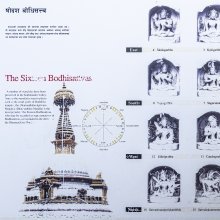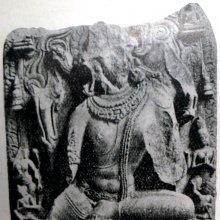Vagishvara, Vāgīśvara: 11 definitions
Introduction:
Vagishvara means something in Buddhism, Pali, Hinduism, Sanskrit. If you want to know the exact meaning, history, etymology or English translation of this term then check out the descriptions on this page. Add your comment or reference to a book if you want to contribute to this summary article.
Vagishvara has 10 English definitions available.
The Sanskrit term Vāgīśvara can be transliterated into English as Vagisvara or Vagishvara, using the IAST transliteration scheme (?).
Images (photo gallery)
(+2 more images available)
Languages of India and abroad
Sanskrit dictionary
[Deutsch Wörterbuch]
Source: Cologne Digital Sanskrit Dictionaries: Böhtlingk and Roth Grosses Petersburger WörterbuchVāgīśvara (वागीश्वर):—
1) m. a) ein Meister in der Redekunst [GĀRUḌA-Pāṇini’s acht Bücher 196 im Śabdakalpadruma] sarvavāgīśvareśvara heisst Viṣṇu [PAÑCAR. 4, 3, 53.] — b) Beiname Brahman's [ŚABDĀRTHAK.] bei [WILSON.] — c) Nomen proprium eines Jina [Trikāṇḍaśeṣa 1, 1, 23.] [Weber’s Indische Studien 8, 467.] [TĀRAN. 236.] — d) Nomen proprium eines Autors [Oxforder Handschriften No. 1006.] Verfassers des Mānamanohara [SARVADARŚANAS. 131, 5.] [MUIR, Stenzler III, 191. 202.] —
2) f. ī Beiname der Sarasvatī [ŚABDĀRTHAK.] bei [Wilson’s Wörterbuch] [Oxforder Handschriften 103,a,35. 106,b, No. 162. 214,b, No. 511.] mantrāḥ [93,b,3.] pūjāyantra [96,a,1.] — Vgl. vādi .
Sanskrit, also spelled संस्कृतम् (saṃskṛtam), is an ancient language of India commonly seen as the grandmother of the Indo-European language family (even English!). Closely allied with Prakrit and Pali, Sanskrit is more exhaustive in both grammar and terms and has the most extensive collection of literature in the world, greatly surpassing its sister-languages Greek and Latin.
See also (Relevant definitions)
Partial matches: Ishvara, Vac.
Starts with: Vagishvara bhatta, Vagishvarakirti, Vagishvarastotra.
Ends with: Dharmadhatuvagishvara, Vadivagishvara.
Full-text (+3): Manamanohara, Dharmadhatuvagishvara, Vagishvarakirti, Vagishvarastotra, Vagishvari, Vagishvaristotra, Vagishvaridatta, Vadivagishvara, Vagishvara bhatta, Krishnananda vagishvara bhattacarya, Vimati, Shrisamaja, Nirmala, Nashin, Nashini, Viratirtha, Nishtha, Vimatinashini, Vimatinashin, Shatkarmadipika.
Relevant text
Search found 12 books and stories containing Vagishvara, Vāgīśvara, Vagisvara, Vag-ishvara, Vāg-īśvara, Vag-isvara; (plurals include: Vagishvaras, Vāgīśvaras, Vagisvaras, ishvaras, īśvaras, isvaras). You can also click to the full overview containing English textual excerpts. Below are direct links for the most relevant articles:
Early Chola Temples (by S. R. Balasubrahmanyam)
Temples in Tondaimanad < [Chapter II - Temples of Parantaka I’s Time]
The Indian Buddhist Iconography (by Benoytosh Bhattachacharyya)
The Gautami Mahatmya (by G. P. Bhatt)
The Linga Purana (by J. L. Shastri)
Chapter 25 - The holy rites of fire pertaining to Śiva < [Section 2 - Pūrvabhāga]
Chapter 27 - The description of the Jaya ablution < [Section 2 - Pūrvabhāga]
Lord Hayagriva in Sanskrit Literature (by Anindita Adhikari)
Hayagrīva in the Hayagrīvopaniṣad < [Chapter 2]
The backdrop of the Srikanthacarita and the Mankhakosa (by Dhrubajit Sarma)
Part 11 - Historical data (found in the Śrīkaṇṭhacarita) < [Chapter IV - Socio-cultural study of the Śrīkaṇṭhacarita]
Related products





